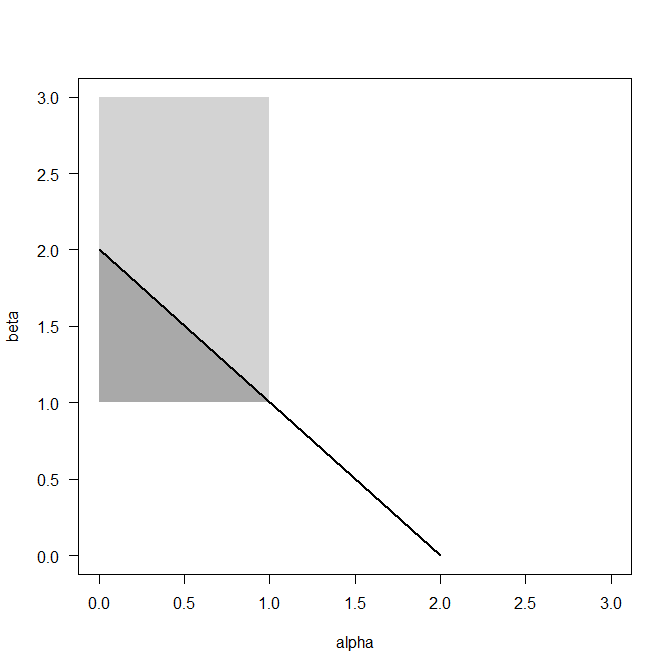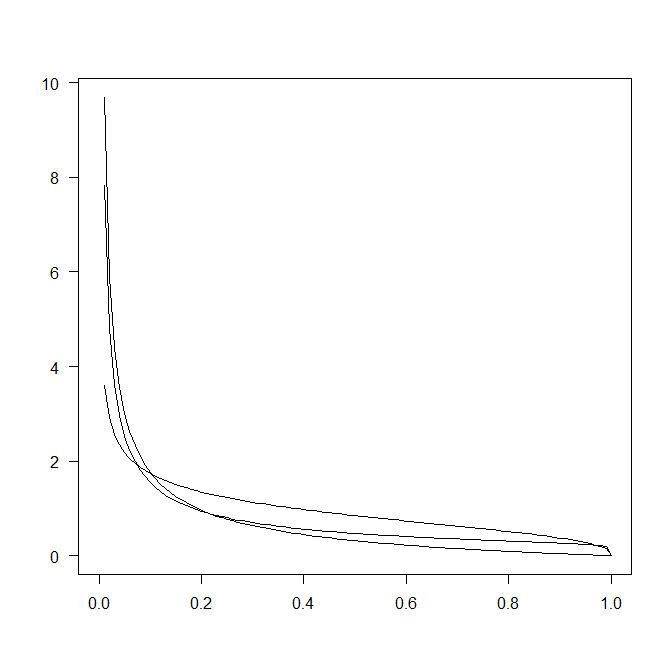As the title suggests, is there any named distribution whose support is $[0,1]$ or $(0,1)$ and its p.d.f. curve looks like exponential distribution (monotonically decreasing over the support)?
-
4$\begingroup$ You could always consider a truncated exponential distribution. The pdf would be $\lambda e^{-\lambda x} / (1 -e^{-\lambda})$. $\endgroup$– AlexRCommented Sep 17, 2020 at 7:21
-
1$\begingroup$ @AlexR: that is actually a good answer. Do you want to post it as such? $\endgroup$– Stephan KolassaCommented Sep 17, 2020 at 7:37
-
2$\begingroup$ Done. Can‘t make any fancy plots as I‘m on the phone, though. $\endgroup$– AlexRCommented Sep 17, 2020 at 7:42
-
1$\begingroup$ Why not just call your support a domain. That way we can use a common language among many mathematical subjects. Just found this - "the support of a real-valued function f is the subset of the domain containing those elements which are not mapped to zero." $\endgroup$– johnCommented Sep 18, 2020 at 6:46
-
3$\begingroup$ @john - In probability the support is often defined as the smallest closed set with probability $1$. This works whether the distribution has a density function or not and whether it is discrete, absolutely continuous, singular or some mixture $\endgroup$– HenryCommented Sep 18, 2020 at 9:26
4 Answers
If you want a distrbution that looks identically to the exponential distribution, up to a multiplicative constant, you can use a truncated exponential distribution.
It is defined by restricting the support of an exponential distribution to the interval of interest and then re-normalizing the density to obtain a distribution. Your case would yield
$$f(x) = \frac{\lambda e^{-\lambda x}}{1 - e^{-\lambda}}$$
-
2$\begingroup$ desmos.com/calculator/kfkvpdlelz $\endgroup$– benxyzzyCommented Sep 17, 2020 at 18:15
The beta distribution will work if and only if $\alpha<1$ and $\beta>1$ (one of the two inequalities can be replaced by $\leq$ and $\geq$ if you don't mind a flat PDF at $x=0$ or $x=1$.)
Its PDF is $$ f(x)=\frac{x^{\alpha-1}(1-x)^{\beta-1}}{B(\alpha,\beta)}, $$ so its derivative is $$ f'(x) = \frac{x^{\alpha-2}(1-x)^{\beta-2}}{B(\alpha,\beta)}\big((\alpha-1)(1-x)-(\beta-1)x\big). $$ For the PDF to be strictly monotonically decreasing for $0<x<1$, we need $$(\alpha-1)(1-x)-(\beta-1)x=(2-\alpha-\beta)x+\alpha-1<0$$ on this interval. This describes a linear function of $x$, so it has its maximum (which we need to be negative) at either $x=0$ or $x=1$, depending on the sign of the slope $2-\alpha-\beta$. We thus have two cases:
Case 1: $2-\alpha-\beta<0$, or $\alpha+\beta>2$. Then our linear function has a negative slope and its maximum at $x=0$, with value $\alpha-1$, so we need $\alpha<1$. The parameter combinations $\alpha+\beta>2$ and $\alpha<1$ are shown by the light gray area in the diagram below. (The bold line is $\alpha+\beta=2$.)
Case 2: $2-\alpha-\beta\geq0$, or $\alpha+\beta\leq2$. Then our linear function has a positive or zero slope and its maximum at $x=1$, with a value of $$2-\alpha-\beta+\alpha-1=1-\beta.$$ We want this to be negative, which is equivalent to $\beta>1$. The parameter combinations of $\alpha+\beta\leq2$ and $\beta>1$ are shown by the dark gray area in the diagram.
The total area is exactly $\alpha<1$ and $\beta>1$.
Here are a few such beta PDFs:
R code for the plots:
plot(0,0,xlim=c(0,3),ylim=c(0,3),type="n",xlab="alpha",ylab="beta",las=1)
polygon(c(0,1,1,0),c(2,1,3,3),col="lightgray",border=NA)
polygon(c(0,1,0),c(1,1,2),col="darkgray",border=NA)
lines(c(0,2),c(2,0),lwd=2)
xx <- seq(0,1,.01)
plot(xx,dbeta(xx,shape1=.3,shape2=2),type="l",las=1,xlab="",ylab="")
lines(xx,dbeta(xx,shape1=.7,shape2=1.4))
lines(xx,dbeta(xx,shape1=.3,shape2=1.1))
The beta distribution can have $\alpha$ and $\beta$ set such that it is:
- Monotonically decreasing
- Supported on $[0, 1]$
Have a look at the example on Wikipedia where $\alpha = 1, \, \beta = 3$, for instance.
There are also readily available implementations of beta regression in R (e.g. betareg), if that is what you want to use it for.
-
2$\begingroup$ I once saw a beta distribution with $\alpha=1$ and $\beta>1$, so density $\beta(1-x)^{\beta-1}$ on $(0,1)$, named as a reversed standard power function distribution $\endgroup$– HenryCommented Sep 18, 2020 at 9:30
There are infinitely many functions that can generate a distribution that is monotonically decreasing and has a support [0,1] (by integrating a positive function adding an integration constant and properly normalizing)
You are looking for a named distribution. That will reduce the options. But you still have many options left and this is a very broad question. (It also becomes unclear because it just depends on how far you go with accepting names, e.g. will "mixture-of-a-triangle-and-a-uniform-distribution" be considered as a 'name'?)
The beta distribution is just the tip of the iceberg. For instance, many truncated distributions will work as well (for a subset of the parameters). The 'truncated exponential distribution' came to my mind the first while reading this question. But something less in intuitive, like a truncated normal distribution (with $\mu<0$), also follows the conditions.
This question is very similar to Common Continuous Distributions with [0,1] support .
You could take a look at this list of probability distributions with supported on a bounded interval on Wikipedia. Not all of those distributions will work, but quite some will work with suitable limits of the parameters.
Since there are many options. If you are looking for some distribution to use in a particular problem, then you will need additional conditions/context/requirements in order to be able to make a choice.


